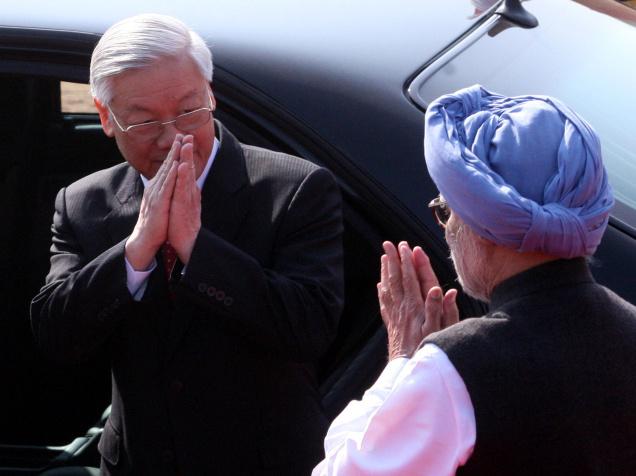NEW DELHI, November 21: Vietnam has offered India seven oil blocks in South China Sea, including three on an exclusive basis, and joint prospecting in some Central Asian countries with which both Hanoi and New Delhi have good political ties.
Following talks between Prime Minister Manmohan Singh and visiting Vietnam Communist Party general secretary Nguyen Phu Trong here on Wednesday, the two sides signed eight pacts of which the ones on energy cooperation and protection of information in defence will intensify the already close ties in these two sectors.
The MoU on oil exploration is for three years and its contents have not been made available. Hence it could not be ascertained whether the allocation will fall foul of China which lays claim to a portion of South China Sea that has been under Vietnam’s jurisdiction.
China had not objected to Vietnam allotting the lucrative Block 6.1 to India during the Cold War years in Nam Con Son Basin of South China Sea. But it objected to India taking up exploration in blocks 127 and 128 in Phu Kanh Basin. Chinese objections have included demarches, pressure on companies not to sell equipment to India and the alleged buzzing of an Indian warship that had transited through the disputed portion of South China Sea.
India returned block 127 some years ago after no oil was found and will return 128 next year after a financially disastrous experience with putting a rig in place.
Defence cooperation
For the defence pact, preparatory work was done during meetings between high ranking officials such as Vietnam’s Chief of General Staff Do Ba Ty and Defence Secretary R.K. Mathur during which they agreed to have greater cooperation in capacity building, joint projects and training.
India has already agreed to train 500 Vietnamese submariners and will transfer four naval boats under a $100-million credit line.
As Dr. Singh noted, “we reaffirmed the importance of defence and security cooperation and agreed to strengthen it further. India will continue to assist Vietnam in modernisation and training of its defence and security forces.”
In a joint statement, both leaders termed defence cooperation a “significant pillar” of strategic partnership and noted the increased pace of defence dialogue, training and exercises, ship visits, capacity building and exchanges between think tanks.
On the economic front, an MoU formalised Vietnam’s decision to award Tata Power a $1.8-billion thermal power project after a failed bid by the same company to set up a $5-billion steel plant. An air services agreement, which was also among the eight to be signed, could lead to direct flights giving a boost to trade and tourism.

